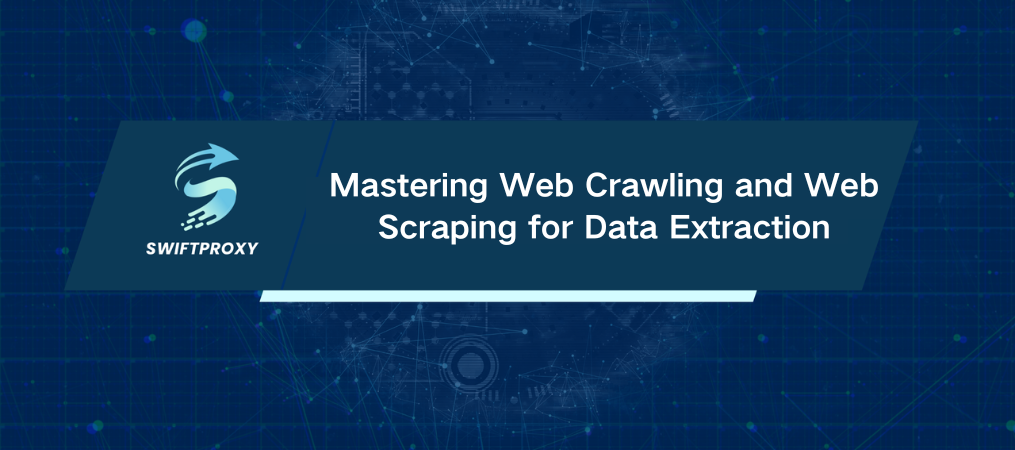Mastering Web Crawling and Web Scraping for Data Extraction

When it comes to extracting data from the vast world of the internet, two methods reign supreme: web crawling and web scraping. Though they often get lumped together, they each have distinct purposes and processes. Understanding these differences is vital for choosing the right technique to suit your needs—whether you're indexing the web or pulling specific data. Let's dive into the details.
Defining the Core: What's the Real Difference
Web Crawling:
At its core, web crawling is about discovery. It's the process of browsing the internet (or a single website) to automatically collect and index pages. Think of it as a spider weaving its web, crawling from one link to the next to map out the digital landscape. This method is crucial for search engines, enabling them to index the entire internet.
Web Scraping:
Web scraping is a more focused, precise approach. It's about extracting specific data from individual web pages. Scraping tools dig into the HTML structure of a site to pull out targeted information—whether it's product prices, customer reviews, or even contact details.
Key Takeaway:
Crawling is about indexing, while scraping is about extraction. They serve different goals and use different methods.
Scope and Process: Broad vs. Focused
Web Crawling:
Crawlers explore widely. They start from a seed URL and systematically follow links, gathering as many pages as possible along the way. The goal? To cover the broadest range of data.
Web Scraping:
Scraping, in contrast, is laser-focused. You typically target specific pages, often using tools like BeautifulSoup or Scrapy. It's about extracting exactly what you need, from one page or a set of pages.
Key Takeaway:
Crawling is a broad net; scraping is a precise tool for specific extractions.
Tools of the Trade: The Right Tool for the Job
Web Crawling Tools:
For large-scale data collection, crawlers use tools like Scrapy, Apache Nutch, or search engines' own bots, like Googlebot. These tools are built to handle mass indexing efficiently.
Web Scraping Tools:
Scraping requires tools designed to parse the data of specific pages. Popular choices include BeautifulSoup, Selenium, and Pandas—each tailored for grabbing particular data, whether it's product details or financial records.
Key Takeaway:
Crawling tools are designed for indexing, scraping tools for targeted data extraction.
Real-World Applications: Crawling vs. Scraping
Web Crawling:
Search engines use web crawling to index the web, while businesses might use crawlers to track website changes. Researchers often crawl the web to collect large datasets for analysis.
Web Scraping:
Scraping shines in tasks like price comparison, lead generation, and sentiment analysis. It's perfect for pulling structured data that powers business intelligence.
Key Takeaway:
Crawling serves large-scale data collection; scraping is best for specific, actionable insights.
Legal and Ethical Boundaries: Play by the Rules
Web Crawling:
Always check a website's robots.txt file. This file tells crawlers which pages are off-limits, helping avoid unauthorized access.
Web Scraping:
Scraping requires caution. Be mindful of copyright laws and the volume of requests you make. Overloading a site with too many requests can lead to IP bans.
Key Takeaway:
Crawling is about indexing publicly available content; scraping often requires permission for deeper access.
How Swiftproxy Supercharges Crawling and Scraping
Looking to level up your web crawling or scraping? Meet Swiftproxy—a powerful tool that enhances both.
Global Access for Geo-Specific Data
Swiftproxy gives you access to over 70 million IPs across 195+ countries. Need regional pricing or local news? Swiftproxy makes it possible to access geo-restricted content with ease.
Avoid Bans and Rate Limits
Websites often limit how many requests you can make. Swiftproxy solves this by rotating IPs, ensuring you won't hit rate limits or get blocked during your scraping or crawling activities.
Anonymity and Security
Swiftproxy masks your real IP address, offering full anonymity while scraping. This keeps your identity hidden and protects you from getting flagged by websites.
High-Volume Operations
With its robust infrastructure, Swiftproxy supports large-scale crawling and scraping projects. Its static IPs ensure consistent access to specific websites without interruption.
Data Privacy
Swiftproxy's no-logging policy means your activities remain completely private—an absolute must for maintaining compliance with privacy regulations.
Conclusion
Web crawling and web scraping might seem similar, but their distinct functions and applications make them suited to different tasks. Whether you're indexing the web or extracting valuable data, Swiftproxy provides security, efficiency, and global access. With the right tools and approach, the digital world is at your fingertips.

















































